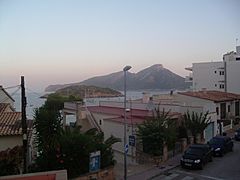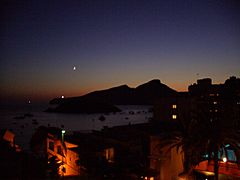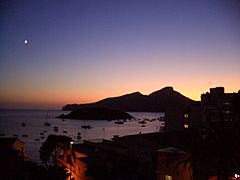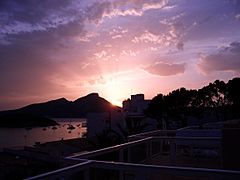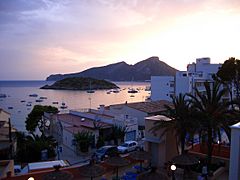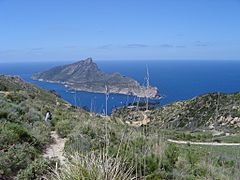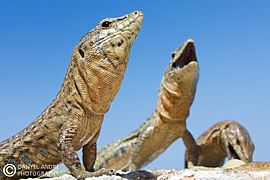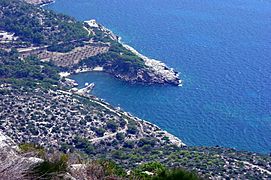Dragonera facts for kids
Quick facts for kids
Dragonera
Sa Dragonera
|
|
|---|---|
|
Island
|
|
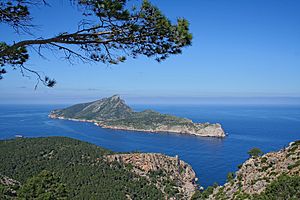
View of Sa Dragonera from nearby Majorca
|
|
| Country | |
| Autonomous community | |
| Council | Consell Insular de Mallorca |
| Municipality | Andratx |
| Area | |
| • Total | 2.88 km2 (1.11 sq mi) |
| Highest elevation | 360 m (1,180 ft) |
| Population
(2009)
|
|
| • Total | no permanent population |
| Time zone | UTC+1 (CET) |
| • Summer (DST) | UTC+2 (CEST) |
Sa Dragonera (Catalan pronunciation: [sə ðɾəɣoˈneɾə]) is a small, uninhabited islet (a very small island) off the west coast of Majorca in Spain. It's part of the beautiful Balearic Islands. Today, this special island is a protected natural park, meaning its wildlife and nature are kept safe.
Contents
What is Sa Dragonera?
Island Shape and Name
Sa Dragonera is about 3.2 kilometers (2 miles) long and 500 meters (0.3 miles) wide. Its highest point, Pico Popi, is 360 meters (1,180 feet) high. The island's shape, especially from certain angles, looks a bit like a sleeping dragon. This is how it got its name, "Dragonera." The island also has many unique Lilford's wall lizards, which are sometimes called "dragons" too!
Where is the Island Located?
Sa Dragonera is part of the municipality of Andratx. This town, along with Sant Elm, is on nearby Majorca and is the closest place to the island. The island has a small natural port called Cala Lladó.
How Was the Island Formed?
Geologists (scientists who study rocks and Earth's structure) believe Sa Dragonera is part of a large mountain system. This system runs from southern Spain, goes under the Mediterranean Sea, and then pops up again to form islands like Ibiza, the Tramuntana Range in Majorca, and Sa Dragonera itself.
History of Sa Dragonera
Early History and Old Buildings
Even though Sa Dragonera is uninhabited now, people have visited it for a long time. Scientists have found an Ancient Roman burial ground (called a necropolis) in the Es Lladó area. This shows that people were here many centuries ago.
In the 1700s, two defensive watchtowers were built on the island. These towers helped look out for Barbary pirates who were active in the area.
Lighthouses and Island Life
In 1910, two new lighthouses, Tramuntana (north) and Llebeig (southwest), started working. They replaced an older lighthouse that was often covered in mist. For many years, lighthouse keepers and their families were the only people living on Sa Dragonera. However, between 1960 and 1975, the lighthouses became automatic. This meant that the keepers were no longer needed, and the island became completely uninhabited.
Attempts to Develop the Island
In 1974, a Spanish company bought Sa Dragonera. They planned to build a big tourist resort with luxury homes, a hotel, a casino, and a new port. However, many environmental groups strongly disagreed with these plans. They started a long legal fight to protect the island's nature.
After ten years, in 1984, a court finally ruled against any building on the island. This was a big win for the environmentalists!
Becoming a Natural Park
In 1987, the Consell Insular de Mallorca (the local government of Majorca) bought the island. Then, in 1995, the Balearic regional government officially declared Sa Dragonera a natural park. This means the island, along with the nearby islets of Pantaleu and Isla Mediana, is now protected. It's a safe home for many plants and animals, including the special lizards that gave the island its name.
Sa Dragonera in Movies
Did you know that part of the 1982 movie Evil Under the Sun, based on an Agatha Christie mystery, was filmed on Sa Dragonera? In the movie, it was shown as a fictional island in the Adriatic Sea.
Gallery
- View of the dragon island at different times and under different atmospheric conditions
-
Dragonera as seen from the Tramuntana Range in Majorca.
-
-
Cala Lladó is the islet's tiny natural harbor
See also
 In Spanish: Isla Dragonera para niños
In Spanish: Isla Dragonera para niños
 | Valerie Thomas |
 | Frederick McKinley Jones |
 | George Edward Alcorn Jr. |
 | Thomas Mensah |



